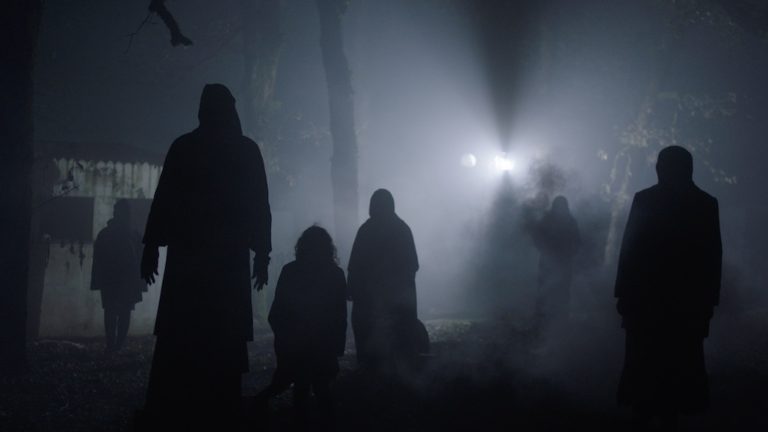Dachra (2021 | Tunisia | 114 minutes | Abdelhamid Bouchnak)
Scores of film buffs in the west know and love Tunisia, whether they realize it or not. The North African country’s enjoyed a rep as a popular location for outside movie productions for decades. Its arid but picturesque deserts provided suitably exotic backdrops for scores of international hits, including Raiders of the Lost Ark, the Star Wars series, The English Patient, and many more.
Tunisia’s indigenous film industry, however, remains less known for its homegrown cinematic output. Despite origins dating back to the 1920s, Tunisia’s movie output has been sporadic over the last 50-odd years. But the last decade has seen a flowering of sorts for Tunisian filmmakers. Director Abdellatif Kechiche became the first director in his nation’s history to win the Cannes Palme D’Or for Blue is the Warmest Color in 2013, and the 2020 Tunisian drama The Man Who Sold his Skin even received its homeland’s first Oscar nomination for Best Foreign Language Film.
Dachra, writer/director/editor/co-producer Abdelhamid Bouchnak’s feature film debut, represents another cinema milestone of sorts for Tunisia. It marks the country’s first major stab at a straight-up horror movie. And while it won’t exactly earn bonus points for its originality, Bouchnak delivers bulk quantities of atmosphere, violence, and mayhem.
After a gruesome and attention-getting cold open, Dachra‘s story proper begins with Yasmine (Yassmine Dimassi), Bilel (Bilel Slatnia), and Walid (Aziz Jbali), three journalism students undertaking a filmed investigation piece as their final project of the semester. Their instructor, burned out on scores of student documentaries on the 2011 Tunisian Revolution, exhorts his pupils to find an original topic. Bilel suggests coverage of an especially disturbing incident from 25 years previous, in which a young woman was found mutilated and left for dead, her throat slit. The mute victim, Mongia, now resides in an insane asylum, and she’s become notorious for tearing a staffer’s ear off. Rumors persist that she’s also a witch.
The students bribe an attendant and sneak onto the mental hospital’s grounds to film Mongia. The encounter (not surprisingly) ends badly, with the inmate mutilating a member of the sanitarium’s current staff and the young journalists beating a hasty retreat. Yasmine, Bilel, and Walid then travel to the original site of the assault in the hopes of finding more definitive answers. And this being a horror movie, what they find ain’t pretty.
Dachra‘s basic premise takes inspiration from some very real horrors distinctive to North Africa. Opening and closing crawls allude to actual witchcraft-related murders that have riddled the region’s history to the present day, and it’s a potent springboard to the action here.
Bouchnak keeps the proceedings pretty universal, delivering the thrills with one foot well-embedded in western horror tradition. Rather than focus on Tunisia’s desert climes, Dachra explores the country’s rural forests—green, fog-enshrouded, inherently foreboding areas seemingly formed by nature to star in a traditional gothic horror movie. And visually, Dachra combines the earthy chilliness of The Witch with the more visceral (and gruesome) tableau of The Texas Chainsaw Massacre.
Plenty of thematic cues likewise surface. The trio’s mission to film in a menacing, possibly sorcery-infested wilderness could readily earn Dachra the alternate title of The Tunisian Witch Project. And Bouchnak’s script indulges in elements of the aforementioned movies, Midsommar/Wicker Man folk horror, and some gnarly cannibalism straight out of an Italian gutmuncher.
This means that Dachra‘s efficacy hinges on a viewer’s readiness to accept genre tropes. Nothing new rears its head metaphorically or literally in Dachra, and characters do Dumb Horror Movie Character Things pretty consistently (though some of those Dumb Things find justification as the story unfolds).
But more than any other film genre, horror can readily transcend familiarity with enough style and verve. Bouchnak possesses both. Much of the movie’s shot in stately medium and long shots so lovely, you almost want to blow them up and frame them, and Bouchnak balances the movie’s shift from slow burn to sledgehammer shocks nimbly (this is a nearly two-hour movie that goes by pretty quickly). Hatem Nechi’s cinematography renders those evocative forests almost tactile, and his camera glides through shots with mesmerizing fluidity. Ultimately, Dachra may be treading familiar ground, but its writer/director surveys that turf with confidence, style, and an already-sharp eye for what chills the hell out of a viewer.
Dachra opens in theaters and virtual cinemas worldwide today, July 9. Photo courtesy Dekanalog.


